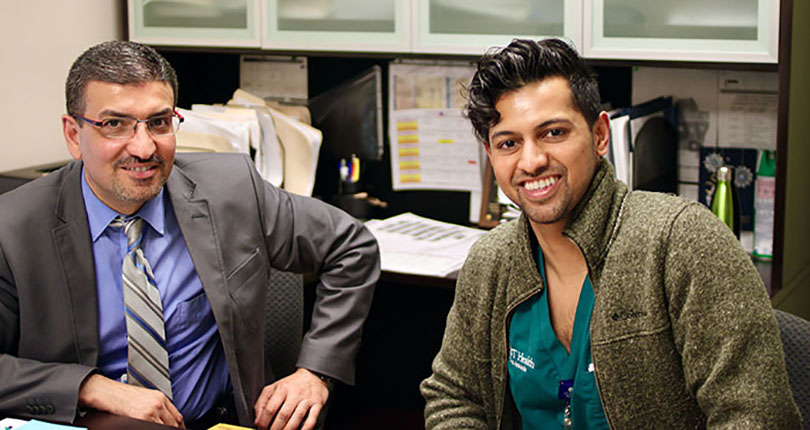Curriculum

Overview
R1-R3 (PGY2 PGY4)
During the first 3 years of the program, the majority of your rotations will be with the diagnostic sections to master diagnostic radiology and prepare for the CORE exam during R3 year. Our integrated residents get increased/early exposure to IR with 2 months of IR each year prior to the dedicated IR years.
R4-R5 (PGY5-PGY6)
During the last 2 years of residency, you will spend most of your time in IR rotations and IR related electives to learn the procedures and build the confidence and competence to practice on your own after graduation. There are two months set aside for IR related electives (ICU and vascular lab). Up to 4 rotations in the DR are also allowed as needed to fulfill the DR requirements such as Nucs, mamo or ER radiology. IR elective are also available in Neuro IR, breast interventions and MSK interventions.
Independent IR residents could get one-year credit toward their training with us if they finished ESIR training at their institution and enroll as PGY6 at the discretion and approval of the IR program director. Independent IR residents will otherwise be enrolled at PGY5 level.
For more information, view the Resident/Fellow Handbook.
Rotation Responsibilities
University Hospital Body IR
During this rotation you will be responsible for and focus on learning most nonvascular IR procedures. This includes all CT and US guided percutaneous biopsies and drain placements, cholecystostomy tubes, chest tubes, paracenteses, and thoracenteses. During call on this service you will be responsible for triaging new consults and preforming any urgent/emergent cases that need to be performed after hours/weekends.
University Hospital Vascular IR
During this rotation you will be responsible for and focus on learning most endovascular cases. This includes case types such as transcatheter chemo or radio-embolization for cancers, transjugular intrahepatic portosystemic shunt (TIPSS) and related procedures, Uterine Fibroid Embolization (UFE), IVC filter placement and retrieval, as well as visceral and peripheral angiograms and their associated interventions. On this service we also cover fluoroscopically guided gastrostomy and nephrostomy tubes, as well port and tunneled line placements and other minor procedures. Call for this service involves triaging new consults for the above cases as well as responding to the “Code Angio” pager which is activated for active bleeding in trauma patients.
VA Hospital IR
On this service you cover the entire gamut of IR cases performed at the VA. Particular strengths of the VA rotation include a valuable experience with dialysis fistula and ischemic lower extremity procedures.
Neuro IR
This rotation allows you to work with our Neurosurgery colleges and gain experience with cerebral cases including diagnostic cerebral angiograms, stroke interventions, cerebral aneurysm interventions, cerebral and spinal AVM interventions.
VA SICU
Typically two rotations (two weeks at a time) at the VA surgical ICU during the PGY5 year, with the resident functioning as an integral member of the ICU team. The resident will typically take responsibility for the care of 3 patients, participate on team rounds, and learn/perfect bedside procedure techniques such as the placement of arterial lines.
Inpatient/Consults
Our official consult service with rotations during the PGY5 and PGY6 years. Typically, a two week rotation. The resident rounds in the morning with our service’s PA, managing recently placed drains as well as evaluating patients having undergone major IR procedures (post TIPS, PE thrombolysis/thrombectomy, embolizations, etc.). The resident also handles consults, triage patients throughout the day and protocols procedures for the Vascular and Body IR services, providing a good education in the necessary pre-procedure evaluation of each patient.
VA Vascular surgery and Vascular lab
This rotation gives you the opportunity to work with our vascular surgery colleges at the VA both in the clinic and OR. You will see some of the clinic patients at the VA as well as learn from the endovascular PAD cases and have the opportunity to learn superficial venous work.
The resident observes and performs vascular ultrasound examinations in real time, including ABI, venous reflux, and dialysis fistula studies.
